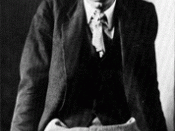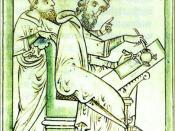In "The Republic", Plato presents many interesting ideas of Socrates' vision of a utopian society. While most of these ideals may work well in theory they would never work if implemented. This has become clear through various attempts at creating utopian societies by various cultures throughout history. However, some aspects of Socrates' philosophies are quite progressive, even by modern standards.
The strongest point that Socrates makes is his belief that women, while usually being weaker physically, are not always the weaker of the genders and should be considered equal and qualified to lead when merited. He makes this point clear in Book V: "...no practice or calling in the life of the city belongs to woman as woman, or to man as man, but the various natures are dispersed among both sexes alike; by nature the woman has a share in all practices, and so has man..."
(253). Socrates advocates for education for women based on this statement, believing that if women are to do the same jobs as men when qualified they should have the same level of education. "Don't forget the women...they may be rulers too!" (340). This is a radical belief for this period in time, and still is in many parts of the world today.
Another strong point in the Republic is the question of justice. The main point in the work is the debate over how just a person can really be and whether it is always right to be so. This is an ethical question. The strongest point in this debate is that there is no one conclusion. There are always shades of gray in any question of ethics. Socrates demonstrates this in Book I when he says that a spy for an army who steals plans from the enemy...



Spelling.
I can't spell opinion. Sorry. Just one of those words I never get right.
0 out of 0 people found this comment useful.